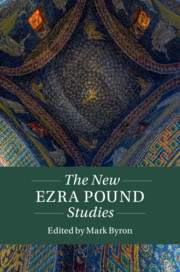Book contents
- The New Ezra Pound Studies
- Twenty-First-Century Critical Revisions
- The New Ezra Pound Studies
- Copyright page
- Contents
- Notes on Contributors
- Key to Abbreviations
- Editor’s Introduction
- Part I Pound’s Texts
- Chapter 1 Classical Literature
- Chapter 2 Early Medieval Philosophy and Textuality
- Chapter 3 Ezra Pound’s Pisan Cantos
- Chapter 4 ‘Scoured and Cleansed’
- Chapter 5 The Visual Field
- Chapter 6 Texts of The Cantos and Theories of Literature
- Chapter 7 Pound and Influence
- Part II Ezra Pound and Asia
- Part III Culture and Politics
- Index
- References
Chapter 2 - Early Medieval Philosophy and Textuality
from Part I - Pound’s Texts
Published online by Cambridge University Press: 17 October 2019
- The New Ezra Pound Studies
- Twenty-First-Century Critical Revisions
- The New Ezra Pound Studies
- Copyright page
- Contents
- Notes on Contributors
- Key to Abbreviations
- Editor’s Introduction
- Part I Pound’s Texts
- Chapter 1 Classical Literature
- Chapter 2 Early Medieval Philosophy and Textuality
- Chapter 3 Ezra Pound’s Pisan Cantos
- Chapter 4 ‘Scoured and Cleansed’
- Chapter 5 The Visual Field
- Chapter 6 Texts of The Cantos and Theories of Literature
- Chapter 7 Pound and Influence
- Part II Ezra Pound and Asia
- Part III Culture and Politics
- Index
- References
Summary
Pound’s inclusion of a musical score in Canto LXXV (C 470–71) asserts a paradox of temporality: the Canto is the shortest by line number in all of The Cantos, yet as words give way to music, the time of reading and of hearing becomes undefined and dilatory. The music is Gerhard Münch’s scoring of the violin part of Clément Janequin’s Chant des Oiseaux of 1537, commissioned by Pound for Olga Rudge to perform at the first of the Tigullian concerts in Rapallo in 1933. Janequin’s score derives from Francesco Canova da Milano’s Canzoni degli Uccelli (c. 1528) – a genealogy all perfectly clear and unambiguous – but this is not what attracts Pound’s attention.
Keywords
- Type
- Chapter
- Information
- The New Ezra Pound Studies , pp. 26 - 39Publisher: Cambridge University PressPrint publication year: 2019

